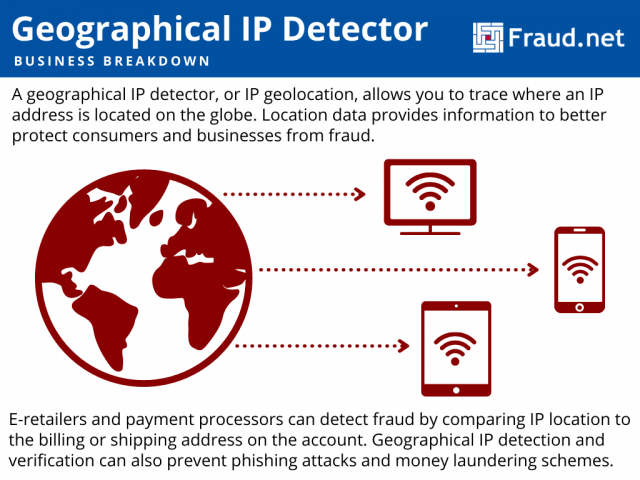What is a Geographical IP Detector?
A geographical IP detector, or IP geolocation, allows you to trace where an IP address is located on the globe. By mapping the IP address geographically you can easily get information on a person’s country. For example, this information might include city, longitude, state, ISP, area code, and other pieces of data. This data provides fraud detection services, marketing firms, and government agencies information to better protect consumers and curate advertising and strategy.
How does it work?
Every device that participates in a computer network possesses a unique IP address, or an “Internet Protocol” address. Each IP packet must contain a header with the IP address of the sender. This header provides IP verification and geolocation services location information to verify legitimate purchases and bank transactions.
Several free and paid geolocation databases exist in each jurisdiction with varying claims of accuracy (the highest is at the country level). Regional internet registries allocate and distribute IP addresses amongst organizations in their regions. For example, the American Registry for Internet Numbers (ARIN) allocates American IPs. Similarly, the API registry, Asia-Pacific Network Information Centre (APNIC) distributes IP addresses and location data in Asia.
More IP data can be determined through data or user submissions:
- Website submitted – for example, what city an IP searches for weather in, or where they order delivery).
- Wi-fi positioning through neighborhood internet providers.
- Bluetooth device locations within a neighborhood.
- Pairing an IP address with a GPS location of the device using the same IP.
- Internet service provider data.
- Routing information.
To get a clearer picture, one can scrub data for anomalies, weigh each address against statistics of user-submitted data, or use third-party tests.
IP geolocation is not without vulnerabilities, however – just as consumers purchase VPNs to keep their geolocation data private, so too do fraudsters.
What is it used for?
Organizations often use geographical IP detection in firewalls, ad servers, routing, mail systems, websites, and automated systems that require or use geolocation. Additionally, some commercial databases even provide IP geolocation and demographic data. Companies use it for demographic-type targeting for strategy and advertising, location-based gaming (ex. Pokemon Go), and regional media licensing. Furthermore, IP geolocation assists 9-1-1 dispatchers in finding the exact location of a caller.
KYC laws
To prevent money laundering, trafficking, and illegal trading, the US government imposes strict “Know-Your-Customer” (KYC) laws on banks and e-retailers. Fortunately, geographical IP detection can help protect banks from being implicated in money laundering schemes by matching IP addresses to online visitors.
Fraud detection
E-retailers and payment processors can detect credit card fraud with geographical IP detection by comparing IP location to the billing or shipping address on the account. When used in authentication, IP geolocation and verification can also prevent phishing attacks and money laundering schemes.
Fraud.net offers a variety of services for fraud prevention, powered by artificial intelligence and machine learning – IP verification is just one of them. With a combination of security protocols that detect and analyze potential fraud, you can protect your organization from threats.





